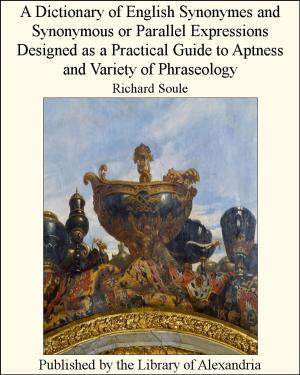Fundamental Philosophy (Complete)
Nonfiction, Religion & Spirituality, New Age, History, Fiction & Literature| Author: | Jaime Luciano Balmes | ISBN: | 9781465605191 |
| Publisher: | Library of Alexandria | Publication: | March 8, 2015 |
| Imprint: | Language: | English |
| Author: | Jaime Luciano Balmes |
| ISBN: | 9781465605191 |
| Publisher: | Library of Alexandria |
| Publication: | March 8, 2015 |
| Imprint: | |
| Language: | English |
We should begin the study of philosophy by examining the question of certainty; before raising the edifice, we must lay the foundation. Ever since there has been philosophy, that is, ever since men first reflected on themselves and the beings around them, they have been engaged with those questions which have for their object the basis of human knowledge, and this shows that on this subject serious difficulties are encountered. Inquirers, however, have not been discouraged by the sterility of philosophical labors; and this shows that in the last term of the investigation an object of high importance is discovered. Philosophers have cavilled in the most extravagant manner upon the questions of certainty; on few subjects has the history of the human mind presented such lamentable aberrations. This consideration may excite suspicion that such investigations offer nothing solid to the mind, and serve only to feed the vanity of the sophist. But here, as elsewhere, we attribute no exaggerated importance to the opinions of philosophers, and we are very far from believing that they ought to be regarded as the legitimate representatives of human reason. It cannot, however, be denied that they are in the intellectual order the most active portion of the human race. When the whole body of philosophers dispute, humanity itself may be said to dispute. Every fact affecting the human race merits a thorough examination; to undervalue it, on account of the sophisms which envelop it, is to fall into the worst of all sophisms. There should be no contradiction between reason and common sense; yet such a contradiction there would be, if we should, in the name of common sense, contemn what occupies the reason of the most enlightened minds. Oftentimes it happens that what is grave and significant, that which makes a thinking man meditate, is the result neither of a disputation, nor of the arguments therein adduced, but the simple existence of the dispute itself. In itself it is sometimes of little importance, but by reason of what it indicates, of great consequence. All philosophical questions are in some manner involved in that of certainty. When we have completely unfolded this, we have examined under one aspect or another all that human reason can conceive of God, man, and the universe. At first sight it may perhaps seem to be the simple foundation of the scientific structure; but in this foundation, if we carefully examine it, we shall see the whole edifice represented: it is a plane whereon is projected, visibly and in fair perspective, the whole body it is to support. However limited may be the direct and immediate result of these investigations, they are of incalculable advantage. It is highly important to acquire science, but not less important to know its limits. Near these limits there are shoals which the navigator ought to know. It is by examining the question of certainty that we ascertain the limits of human science. In descending to the depths to which these questions lead us, the understanding grows dim, and the heart is awed with a religious fear. A moment ago we were contemplating the edifice of human knowledge, and grew proud to see it with its colossal dimensions, its beautiful forms, its fine and bold construction; we enter it, and are led through deep caverns, and, as if by enchantment, the foundation seems to be subtilized, to evaporate, and the superb edifice remains floating in the air.
We should begin the study of philosophy by examining the question of certainty; before raising the edifice, we must lay the foundation. Ever since there has been philosophy, that is, ever since men first reflected on themselves and the beings around them, they have been engaged with those questions which have for their object the basis of human knowledge, and this shows that on this subject serious difficulties are encountered. Inquirers, however, have not been discouraged by the sterility of philosophical labors; and this shows that in the last term of the investigation an object of high importance is discovered. Philosophers have cavilled in the most extravagant manner upon the questions of certainty; on few subjects has the history of the human mind presented such lamentable aberrations. This consideration may excite suspicion that such investigations offer nothing solid to the mind, and serve only to feed the vanity of the sophist. But here, as elsewhere, we attribute no exaggerated importance to the opinions of philosophers, and we are very far from believing that they ought to be regarded as the legitimate representatives of human reason. It cannot, however, be denied that they are in the intellectual order the most active portion of the human race. When the whole body of philosophers dispute, humanity itself may be said to dispute. Every fact affecting the human race merits a thorough examination; to undervalue it, on account of the sophisms which envelop it, is to fall into the worst of all sophisms. There should be no contradiction between reason and common sense; yet such a contradiction there would be, if we should, in the name of common sense, contemn what occupies the reason of the most enlightened minds. Oftentimes it happens that what is grave and significant, that which makes a thinking man meditate, is the result neither of a disputation, nor of the arguments therein adduced, but the simple existence of the dispute itself. In itself it is sometimes of little importance, but by reason of what it indicates, of great consequence. All philosophical questions are in some manner involved in that of certainty. When we have completely unfolded this, we have examined under one aspect or another all that human reason can conceive of God, man, and the universe. At first sight it may perhaps seem to be the simple foundation of the scientific structure; but in this foundation, if we carefully examine it, we shall see the whole edifice represented: it is a plane whereon is projected, visibly and in fair perspective, the whole body it is to support. However limited may be the direct and immediate result of these investigations, they are of incalculable advantage. It is highly important to acquire science, but not less important to know its limits. Near these limits there are shoals which the navigator ought to know. It is by examining the question of certainty that we ascertain the limits of human science. In descending to the depths to which these questions lead us, the understanding grows dim, and the heart is awed with a religious fear. A moment ago we were contemplating the edifice of human knowledge, and grew proud to see it with its colossal dimensions, its beautiful forms, its fine and bold construction; we enter it, and are led through deep caverns, and, as if by enchantment, the foundation seems to be subtilized, to evaporate, and the superb edifice remains floating in the air.















